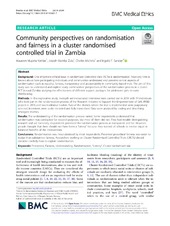| dc.contributor.author | Kombe, Maureen Mupeta | en_US |
| dc.contributor.author | Zulu, Joseph Mumba | en_US |
| dc.contributor.author | Michelo, Charles | en_US |
| dc.contributor.author | Sandøy, Ingvild Fossgard | en_US |
| dc.date.accessioned | 2020-08-18T08:14:43Z | |
| dc.date.available | 2020-08-18T08:14:43Z | |
| dc.date.issued | 2019-12-21 | |
| dc.Published | Kombe, Zulu, Michelo C, Sandøy IF. Community perspectives on randomisation and fairness in a cluster randomised controlled trial in Zambia. BMC Medical Ethics. 2019;20:99 | eng |
| dc.identifier.issn | 1472-6939 | |
| dc.identifier.uri | https://hdl.handle.net/1956/23843 | |
| dc.description.abstract | Background: One important ethical issue in randomised controlled trials (RCTs) is randomisation. Relatively little is known about how participating individuals and communities understand and perceive central aspects of randomisation such as equality, fairness, transparency and accountability in community-based trials. The aim of this study was to understand and explore study communities’ perspectives of the randomisation process in a cluster RCT in rural Zambia studying the effectiveness of different support packages for adolescent girls on early childbearing. Methods: In this explorative study, in-depth semi-structured interviews were carried out in 2018 with 14 individuals who took part in the randomisation process of the Research Initiative to Support the Empowerment of Girls (RISE) project in 2016 and two traditional leaders. Two of the districts where the trial is implemented were purposively selected. Interviews were audio recorded and fully transcribed. Data were analysed by coding and describing emergent themes. Results: The understanding of the randomisation process varied. Some respondents understood that randomisation was conducted for research purposes, but most of them did not. They had trouble distinguishing research and aid. Generally, respondents perceived the randomisation process as transparent and fair. However, people thought that there should not have been a “lottery” because they wanted all schools to receive equal or balanced benefits of the interventions. Conclusions: Randomisation was misunderstood by most respondents. Perceived procedural fairness was easier to realize than substantive fairness. Researchers working on Cluster Randomised Controlled Trials (CRCTs) should consider carefully how to explain randomisation. | en_US |
| dc.language.iso | eng | eng |
| dc.publisher | BioMed Central | eng |
| dc.rights | Attribution CC BY | eng |
| dc.rights.uri | http://creativecommons.org/licenses/by/4.0/ | eng |
| dc.title | Community perspectives on randomisation and fairness in a cluster randomised controlled trial in Zambia | en_US |
| dc.type | Peer reviewed | |
| dc.type | Journal article | |
| dc.date.updated | 2020-01-30T20:13:06Z | |
| dc.description.version | publishedVersion | en_US |
| dc.rights.holder | Copyright 2019 The Authors | |
| dc.identifier.doi | https://doi.org/10.1186/s12910-019-0421-7 | |
| dc.identifier.cristin | 1780810 | |
| dc.source.journal | BMC Medical Ethics | |
| dc.relation.project | Norges forskningsråd: 223269 | |
| dc.relation.project | Norges forskningsråd: 248121 | |

